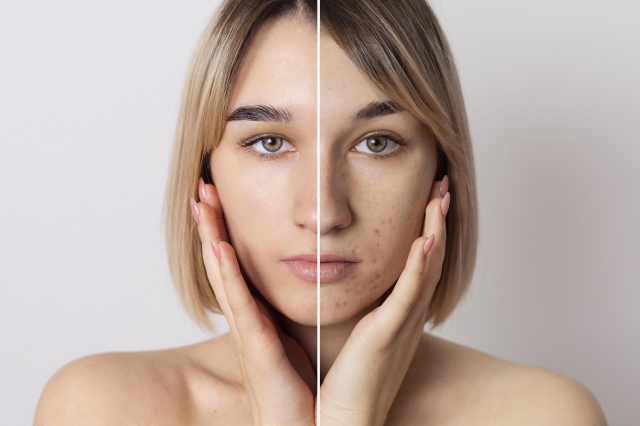What Is Skin Pigmentation?
Skin pigmentation refers to the natural color of your skin determined by melanin, a pigment produced by specialized cells known as melanocytes. When these cells produce too much or too little melanin, it results in uneven skin tone or dark patches. This condition can appear on any part of the body but is most noticeable on the face, neck, and hands.
Hyperpigmentation, hypopigmentation, and melasma are the most common pigmentation concerns. While harmless, these conditions can affect self-esteem and confidence, making professional treatment an appealing option for many individuals.
Expert Solutions at Royal Cosmetic Surgery
At Royal Cosmetic Surgery, patients receive customized skincare solutions tailored to their unique pigmentation concerns. The clinic is renowned for its advanced dermatological techniques and experienced cosmetic specialists who understand the complexity of skin tones and melanin behavior.
Whether caused by hormonal changes, excessive sun exposure, or acne scars, pigmentation issues are treated with precision and care. The clinic offers both non-invasive and medical-grade solutions to restore balance and improve overall skin clarity. With the latest technologies, patients can expect visible improvements and long-lasting results.
Common Causes of Uneven Pigmentation
Pigmentation issues don't develop overnight. A variety of internal and external factors contribute to the overproduction or underproduction of melanin. Here are some common culprits:
-
Sun Exposure: UV rays trigger melanin production, leading to tanning or sunspots.
-
Hormonal Changes: Pregnancy, menopause, or birth control pills can cause melasma.
-
Aging: Over time, cell regeneration slows down, making dark patches more visible.
-
Inflammation or Injury: Post-inflammatory hyperpigmentation can appear after acne or cuts.
-
Genetics: Some people are simply more prone to pigmentation issues due to their genetic makeup.
Understanding these causes helps determine the most effective treatment plan for restoring healthy, balanced skin.
Advanced Techniques for Lasting Results
Modern cosmetic treatments have revolutionized the management of pigmentation concerns. Dermatologists now use a combination of therapies to achieve optimal outcomes, depending on skin type and severity. Some of the most effective methods include:
-
Laser Therapy: Targets deeper pigmentation layers to break down melanin clusters.
-
Chemical Peels: Remove dead skin cells and stimulate new cell growth for a brighter complexion.
-
Microdermabrasion: Gently exfoliates the skin, improving tone and texture.
-
Topical Creams: Contain ingredients like hydroquinone, retinoids, or vitamin C to lighten dark spots.
-
Photofacials: Use light-based technology to rejuvenate the skin and reduce discoloration.
Each of these treatments must be performed by a qualified specialist to avoid irritation and ensure safety.
Benefits of Professional Skin Pigmentation Treatment
Choosing professional Skin Pigmentation Treatment ensures that your specific skin condition is diagnosed and treated correctly. Unlike over-the-counter creams or home remedies, clinical treatments address the root cause rather than just the symptoms.
Some key benefits include:
-
Even and radiant skin tone
-
Reduction of dark spots and blemishes
-
Enhanced collagen production for smoother texture
-
Improved skin confidence and natural glow
Professional care ensures safe and effective results tailored to your skin's unique needs.
How to Maintain Pigment-Free Skin
After treatment, maintaining results requires consistent care and protection. A proper skincare routine and preventive measures can help keep pigmentation from returning. Experts recommend:
-
Applying broad-spectrum sunscreen daily
-
Using antioxidant serums with vitamin C or niacinamide
-
Keeping your skin moisturized to maintain its natural barrier
-
Avoiding harsh exfoliants that may irritate sensitive skin
-
Scheduling follow-up sessions with your dermatologist for ongoing assessment
Consistency is key—skin improvement doesn't happen overnight, but long-term care makes a lasting difference.
Why Professional Guidance Matters
Skin pigmentation may seem like a purely cosmetic concern, but it often reveals deeper skin imbalances. That's why consulting a professional is crucial. Clinics like Royal Cosmetic Surgery not only treat visible discoloration but also assess lifestyle, diet, and hormonal factors contributing to pigmentation.
Personalized treatment plans, advanced technology, and medical expertise make all the difference in achieving clear, even-toned skin. Self-treatment or unverified products can worsen pigmentation or cause irritation, so always seek professional advice before starting any new regimen.
Final Thoughts
Skin pigmentation can be challenging, but it's not irreversible. With modern dermatological advancements and expert care, restoring your skin's natural radiance is entirely possible. Trust in professionals like Royal Cosmetic Surgery, where science and aesthetics come together to help you achieve your best skin yet.
Your journey to a glowing, balanced complexion begins with understanding your skin—and choosing the right hands to care for it.






